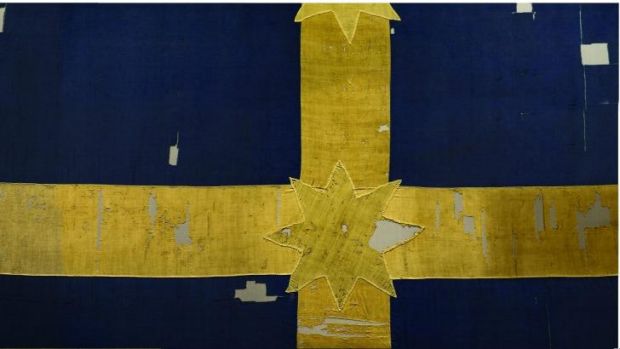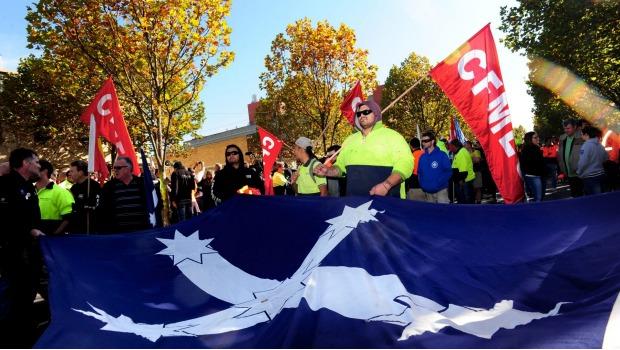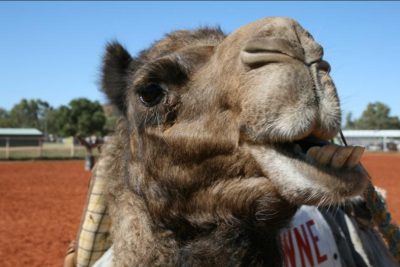by Dr. Jim Saleam, June 12 2017
Since we commented here about the new film by Warwick Thornton on the matter of the Southern Cross Flag (Eureka Flag), the debate / discussion has gone national.
We are advised that versions of the article linked here (like the one we linked to last week) have appeared in paper and electronic versions across the country, sparking other comment.
 Symbol of Australian nationalist freedom since 1854
Symbol of Australian nationalist freedom since 1854
This article says that the Southern Cross Flag is the Australian “swastika”, and that it has been “hijacked” by extreme nationalists and racists. It contains a photo of our logo for ballot papers as registered by the Australian Electoral Commission.
All this is culture war stuff and the nationalists intend to win it. We do not intend smear mongers to falsify the nature of this essential Australian icon.
Let me go to the start: the nationalists have hijacked nothing.
As we endlessly repeat, the Southern Cross flag had been ‘hijacked’ in the 1970’s by a group of China-Maoist-line communists. They concealed their loyalty to the Peking imperialists by making references to having an independent Australia free of US and USSR influence. They also talked of a new constitution after the Whitlam sacking.
Bank in August 1977, a group of university-based nationalists opted to employ the Southern Cross flag as the only possible symbolic representation for an Australia First movement. Step by step from that time, nationalists redeemed the flag from these people and other despoilers of it.
Today, it is used by nationalists and other patriots and that is proper and historically correct.
Australia First Party considers the widespread use of the Southern Cross Flag by nationalists and other patriots as a blow to those who wanted to wage a particular culture war (sic) against the Australian people.
It means a defeat for them.
The Australian nation only exists because of our White European ancestors.
Critics ignore the alternatives.
Whether or not we use the Southern Cross flag as part of our electoral logo, or fly it ourselves, we urge all pro Australian groups to do the same.
It is not the possession of a party but a people’s flag. In the current climate, we would to use Henry Lawson’s words “fling out the flag of the Southern Cross” against those who would colonise our land, dispossess us of our heritage and its promise and turn us over to the good graces of an Asian trade zone.
Here’s Warwick Thornton’s fantasy produced by full-of-hate, small woman ring-in at Fairfax’s left-weekly Brisbane Times
 Leftie self-indulgence doesn’t become her
Leftie self-indulgence doesn’t become her
‘The Southern Cross is becoming the new Swastika’: New documentary examines ‘hijacking’ of national icon (whatever)
Warwick Thornton was basking in the success of his award-winning feature film Samson and Delilah in 2010, when one simple remark prompted widespread national outrage.
“I’m concerned the Southern Cross is becoming the new Swastika,” he said.
Like many Australians, the Alice Springs-raised Mr Thornton could see parallels between the hijacking of the two symbols for the extreme nationalist cause.
Filmmaker Warwick Thorton examines the history and significance of the Southern Cross in a new documentary showing at the Sydney Film Festival.Source:Supplied
The Swastika, a Sanskrit symbol for good fortune, is now synonymous with death in the west, after being adopted as the symbol of Germany’s murderous Nazi Party in the 1930s.
Similarly, the Southern Cross has been adopted in Australia by the extreme right-wing as a symbol of bigotry, hatred and nationalist pride, though obviously not to the same, murderous extreme.
The Southern Cross, along with the Australian flag, is the favoured symbol of groups such the anti-Muslim Reclaim Australia and United Patriots Front movements.
Simply put, Mr Thornton said, the Southern Cross has been “hijacked by dickheads”.
Thornton’s considering getting a Southern Cross tattoo.”
Seven years on, the 2010 Australian of the Year nominee has made the symbolism of the Southern Cross the subject of a new documentary, We Don’t Need a Map, screening as part of the Sydney Film Festival.
Thornton told ABC Radio National’s Awaye program the vehement reaction to his 2010 comparison of the Southern Cross and the Swastika took him by surprise.
“People got very upset, and that scared the hell out of me,” he told the program.
“I went and hid in the cupboard for a little while, and then over a couple of years, I got angry.”
The result was We Don’t Need a Map, a kind of Australian road trip that examines the spiritual importance of the five constellations to the country’s indigenous people and how, among nationalist groups, the Southern Cross morphed into a symbol bearing such potent power.
Would Thornton have preferred French Colonisation? – Imperial France prosecuted the Code Noir (‘black code’) slave trade from 1685 – 1794 and could have colonized Australia.
“This is the story of the hijacking of an Australian icon,” goes the promotional slogan.
Mr Thornton is hoping to prompt a national discussion about the symbol, though perhaps one a little more measured than the one that followed his comments seven years ago.
“Where do we stand? Are we standing with our chest all puffed out, wrapped in the flag, afraid that someone’s coming to steal our beers and barbecues?”
“It might be time we have a serious and sober conversation about our national symbol and ask the question, are we becoming dickheads?”
The celestial Southern Cross, only visible in the southern hemisphere, not only formed an integral part of the Aboriginal Dreamtime, it more famously became the symbol of the 1854 Eureka Rebellion on the central Victorian goldfields, in which oppressed miners swore allegiance to it in their revolt against the colonial authority.
Would Thornton have preferred Japanese Colonisation?
While the spirit of the Eureka Rebellion has seen it remain a favoured symbol of the far left and trade unions, it has, since the 1980s, been far more potently adopted by the far right.
In the film, Mr Thompson interviews a diverse array of Australians about the Southern Cross, from tattoo artists — many of whom refer to it as the “Aussie Swazi” thanks to ubiquitous requests for the symbol — to academics, artists, advertisers and, of course, Aboriginal people.
He also interviews former surf lifesaver Phil Dennis, who had the Southern Cross tattooed on his back 12 years ago in honour of his great uncle Percy who died at Gallipoli, and Percy’s son Sydney, who perished in WWII.
He got the tattoo, he said, to honour his heritage and to reflect his pride in his family and his country.
Then things changed, he wrote in an opinion piece for the ABC last year.
“I got that tattoo before Cronulla. I got that tattoo before Bendigo,” he said, of high profile race riots and anti-Islam protests, where the Eureka flag was prominently displayed.
“Since then, groups such as Reclaim Australia and United Patriots Front all have used our flag, our symbols, to hide behind. To peddle their view point, their propaganda.
“My Southern Cross has been hijacked.
“At first I didn’t realise the impact it would have. But as summers passed; on the beach teaching nippers, at the pool teaching kids how to swim and eventually as a teacher, teaching surfing, I have heard passing comments, fragments of conversations from parents, peers and students on how they interpret the tattoo on my back.
“The person they see in the symbol I wear is not who I am.
“I’m not a racist, a bigot or violent.”
Would Thornton prefer more Muslim Colonisation?
Also among the interviewees in We Don’t Need a Map is Big Day Out founder Ken West, who banned the Australian flag from the national festival in 2007, because of its corruption as a symbol of racism and bigotry.
Being in front of the camera is a departure for Mr Thornton, for whom Samson and Delilah, his first feature film, won him the prestigious Cannes Film Festival Camera d’Or prize in 2009.
The film was described as a “survival love story”, depicting two Aboriginal teenagers who steal a car to drive to Alice Springs.
In the end, he said the exploratory documentary taught him a lot, even mellowing that forcefully-held opinion that catapulted him into the centre of a national debate in 2010.
“The irony is, after making the film, I won’t judge that book by its cover any more,” he told Radio National.
“Hey, I might even get a Southern Cross tattoo.”
It all sounds South Africa ANC Negro hateful. Thornton’s film made a loss of course, as usual. It was funded by White Australian taxpayers who actually work for a living.



